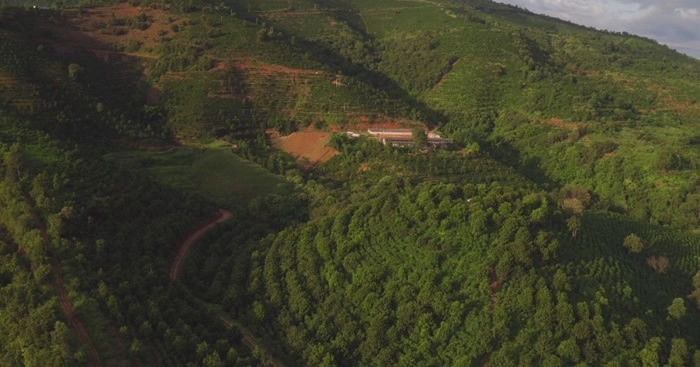
China
17:37, 06-Sep-2017
China Footprint: Large scale farming leads to high productivity in China
By Jeff Moody, Zhao Yuheng

Young people leave for the big cities, abandoning the already limited arable land, and as this land is distributed among individual households, it is difficult to make the change to large scale farming. These are the problems facing rural China today, but what are the solutions?
Contracting and re-contracting
Hogood Coffee Company, located in the quaint little town of Mangshi, Dehong Autonomous Prefecture in southwest China's Yunnan Province, near the border with Myanmar, turns over a billion yuan (about 153 million US dollars) a year by growing 200,000 tons of coffee beans, and producing coffee and coffee products that are exported all round the world.

Coffee beans ripening in Mangshi, Dehong Autonomous Prefecture, southwest China's Yunnan Province. /CGTN Photo
Coffee beans ripening in Mangshi, Dehong Autonomous Prefecture, southwest China's Yunnan Province. /CGTN Photo
To do this, the company takes advantage of the increasingly relaxed farm land use policy. This is how the scheme works: The company contracts farmers' land to grow coffee then re-contracts the land back to the farmers, employing them to work on the farms. When it's time for harvest, the beans are purchased from the farmers. The result is high productivity for the corporation, and better livelihood for the farmers.
"I think with this measure, there will be less abandoned land in the future. Secondly, it solves the employment issue for households who are living in poverty," said Fan Shaojiang, deputy manager of Hogood Coffee.

Fan Shaojiang, deputy manager of Hogood Coffee. /CGTN Photo
Fan Shaojiang, deputy manager of Hogood Coffee. /CGTN Photo
'Life gets much better'
Jiang Shihuai has been farming in the deep mountains in the "south of the cloud" (the literal meaning of Yunnan) for years. He owns a track of land in the mountain by the side of a river valley - on the other side of the river is Myanmar. Years ago he would sow maize here and there in his land, and when harvest came, the corn went to the feed for the pigs he raised. Life was hard in the mountains.
After he signed the contract with Hogood, the company planted coffee seedlings in his land, and when the coffee bushes were grown, re-contracted the land back to Jiang.
This was so successful that the company signed similar contracts with Jiang's neighbors. Now Mangshi boasts one of the largest coffee production bases in the region. Currently there are around 14,000 acres of coffee farms in the prefecture.

Jiang Shihuai, a coffee farmer in Mangshi, Dehong Autonomous Prefecture, southwest China's Yunnan Province. /CGTN Photo
Jiang Shihuai, a coffee farmer in Mangshi, Dehong Autonomous Prefecture, southwest China's Yunnan Province. /CGTN Photo
A third party in the coffee game
The local government act as a third layer here. They are the middle men, who ensure the scheme runs smoothly, and provides a helping hand when it is needed.
The prefectural government has also allocated 4.5 million US dollars annually to support local companies in expanding their businesses.

There are around 14,000 acres of coffee farms in Dehong Autonomous Prefecture, southwest China's Yunnan Province. /CGTN Photo
There are around 14,000 acres of coffee farms in Dehong Autonomous Prefecture, southwest China's Yunnan Province. /CGTN Photo
The national agriculture industrialization program is how the country aims to modernize its agriculture and carry reforms to a new level, with the intention of securing a brighter future for Jiang and letting Chinese productivity really grow.
2433km
China Footprint (CGTN's special series):

SITEMAP
Copyright © 2018 CGTN. Beijing ICP prepared NO.16065310-3
Copyright © 2018 CGTN. Beijing ICP prepared NO.16065310-3